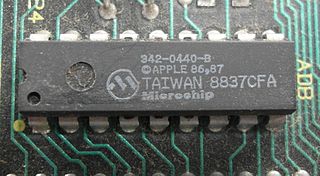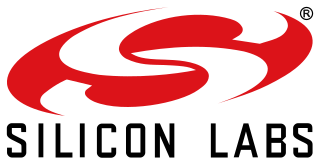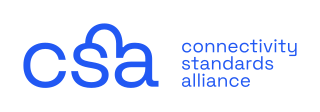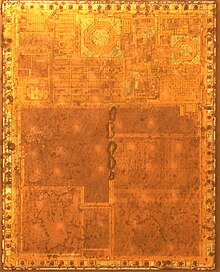Zigbee is an IEEE 802.15.4-based specification for a suite of high-level communication protocols used to create personal area networks with small, low-power digital radios, such as for home automation, medical device data collection, and other low-power low-bandwidth needs, designed for small scale projects which need wireless connection. Hence, Zigbee is a low-power, low data rate, and close proximity wireless ad hoc network.

Synopsys is an American electronic design automation (EDA) company headquartered in Sunnyvale, California that focuses on silicon design and verification, silicon intellectual property and software security and quality. Synopsys supplies tools and services to the semiconductor design and manufacturing industry. Products include tools for logic synthesis and physical design of integrated circuits, simulators for development, and debugging environments that assist in the design of the logic for chips and computer systems. As of 2023, the company is a component of both the Nasdaq-100 and S&P 500 indices.

A wireless mesh network (WMN) is a communications network made up of radio nodes organized in a mesh topology. It can also be a form of wireless ad hoc network.

Nordic Semiconductor ASA is a Norwegian fabless technology company specializing in designing ultra-low-power wireless communication semiconductors and supporting software for engineers developing and manufacturing IoT products.

Z-Wave is a wireless communications protocol used primarily for residential and commercial building automation. It is a mesh network using low-energy radio waves to communicate from device to device, allowing for wireless control of smart home devices, such as smart lights, security systems, thermostats, sensors, smart door locks, and garage door openers. The Z-Wave brand and technology are owned by Silicon Labs. Over 300 companies involved in this technology are gathered within the Z-Wave Alliance.

Microchip Technology Inc. is a publicly listed American corporation that manufactures microcontroller, mixed-signal, analog, and Flash-IP integrated circuits. Its products include microcontrollers, Serial EEPROM devices, Serial SRAM devices, embedded security devices, radio frequency (RF) devices, thermal, power and battery management analog devices, as well as linear, interface and wireless products.
Tilera Corporation was a fabless semiconductor company focusing on manycore embedded processor design. The company shipped multiple processors in the TILE64, TILEPro64, and TILE-Gx lines.

Daintree Networks, Inc. was a building automation company that provided wireless control systems for commercial and industrial buildings. Founded in 2003, Daintree was headquartered in Los Altos, California, with an R&D lab in Melbourne, Australia.
MiWi is a proprietary wireless protocol supporting peer-to-peer, star network connectivity. It was designed by Microchip Technology. MiWi uses small, low-power digital radios based on the IEEE 802.15.4 standard, and is designed for low-power, cost-constrained networks, such as industrial monitoring and control, home and building automation, remote control, wireless sensors, lighting control, and automated meter reading.
EFM32 Gecko MCUs are a family of mixed-signal 32-bit microcontroller integrated circuits from Energy Micro based on ARM Cortex-M CPUs, including the Cortex-M0+, Cortex-M3 and Cortex-M4.

An 802.15.4 radio module is a small device used to communicate wirelessly with other devices according to the IEEE 802.15.4 protocol.

Silicon Laboratories, Inc. is a fabless global technology company that designs and manufactures semiconductors, other silicon devices and software, which it sells to electronics design engineers and manufacturers in Internet of Things (IoT) infrastructure worldwide.

Digi XBee is the brand name of a popular family of form factor compatible wireless connectivity modules from Digi International. The first XBee modules were introduced under the MaxStream brand in 2005 and were based on the IEEE 802.15.4-2003 standard designed for point-to-point and star communications. Since the initial introduction, the XBee family has grown and a complete ecosystem of wireless modules, gateways, adapters and software has evolved.

Redpine Signals is a fabless semiconductor company that started its operation in 2001. The company makes chipsets and system-level products for wireless networks. It serves the Internet of Things and wireless embedded systems market, enabling all volume levels of chipsets and modules.

GreenPeak Technologies was an Utrecht, Netherlands-based fabless company developing semiconductor products and software for the IEEE 802.15.4 and Zigbee wireless market segment. Zigbee technology is used for Smart Home data communications and to facilitate the Internet of Things, the term used to refer to devices designed to be operated and managed by internet-enabled controllers and management systems.
Thread is an IPv6-based, low-power mesh networking technology for Internet of things (IoT) products. The Thread protocol specification is available at no cost; however, this requires agreement and continued adherence to an End-User License Agreement (EULA), which states that "Membership in Thread Group is necessary to implement, practice, and ship Thread technology and Thread Group specifications."
Universal Electronics Inc. (UEI) is an American smart home technology provider and manufacturer of universal remote controls, IoT devices such as voice-enabled smart home hubs, smart thermostats, home sensors; as well as a white label digital assistant platform optimized for smart home applications, and other software and cloud services for device discovery, fingerprinting and interoperability. The company designs, develops, manufactures and ships products both under the "One For All" brand and as an OEM for other companies in the audio video, subscription broadcasting, connected home, tablet and smart phone markets. In 2015, it expanded its product and technology platform to include home automation, intelligent sensing and security.
Matter is an open-source connectivity standard for smart home and Internet of things devices, which aims to improve their compatibility and security.

Develco Products is a B2B wireless technology producer, headquartered in Aarhus, Denmark. The company was established in 2007 and develops white label devices for B2C solution providers and has over 3,500,000 devices deployed worldwide... Their main business areas are home care, security, and smart energy. They are a member of the Connectivity Standards Alliance as their main technological expertise lies in Zigbee-based devices that communicate through a mesh network. The company claims their most popular product is the Squid.link gateway.

The Connectivity Standards Alliance (CSA), formerly the Zigbee Alliance, is a group of companies that maintain and publish the Zigbee and Matter standard, along with several others. The name Zigbee is a registered trademark of this group, and is not a single technical standard. The organization publishes application profiles that allow multiple OEM vendors to create interoperable products. The relationship between IEEE 802.15.4 and Zigbee is similar to that between IEEE 802.11 and the Wi-Fi Alliance.












